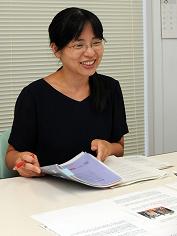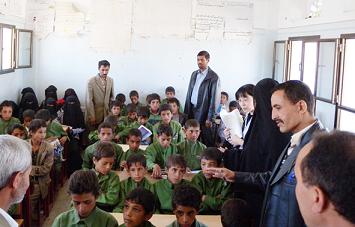Interview【JICA-RI Focus Vol.10】Interview with Research Fellow Takako Yuki
2010.12.14

Research Fellow Takako Yuki currently leads the research project “Human capital formulation and gender equality in conflict-affected Islamic states: case of basic education in Yemen” which was launched in April. In this interview, she talks about the significance and purpose, as well as the expected outcomes of this research.
Please tell us about the background of your research themes, "conflict-affected Islamic states", "gender equality", and "human capital formulation."
"Promoting gender equality and empowering women" is one of the main goals of the Millennium Development Goals (MDGs) adopted by the United Nations in 2000. Gender equality is also becoming an increasingly important focus for other development goals, such as "eradicating extreme poverty and hunger" and "achieving universal primary education". Meanwhile, not only do international and domestic conflicts pose a threat to sustainable growth and socioeconomic development, but exacerbate the risks of conflict with the resulting economic and social poverty problems.
Against such backgrounds, the “Education for All (EFA)” movement, pledged initially at the World Education Forum in 1990, has been renewing wide recognition throughout the international community. This research is based on the idea that providing quality education for all children, adolescents and adults regardless of gender, will not only be the key to eliminating inequality and mitigating risks of social conflict, but also heighten development effectiveness. However, girls’ school enrollment rates, especially in developing Islamic states, are very low compared to boys’, and this is an issue that the international community including Japan must tackle.
The research project “Human capital formulation and gender equality in conflict-affected Islamic states: Case of basic education in Yemen,” launched this April, focuses on Yemen, one of the poorest Islamic countries in fragile socioeconomic situations, as it faces with many challenges in primary education development and gender equality promotion. This research will closely examine the progress and challenges of the country’s efforts in promoting female education, and attempt to deepen our understanding as to what kind of policies could work toward these goals under what conditions.

An elementary school in Yemen visited during the field survey
Among developing Islamic states, countries such as Pakistan and Bangladesh have been the subject of extensive research, while Arabic-speaking countries like Yemen are less researched, due to language barriers and difficulties for researchers in entering the field. In that respect, this research project should be of a vital interest not only for the Japanese government but for the international community as well.
Please explain the details of your research.
From observing the school enrollment rate of girls in Yemen’s primary education curriculum, we found that there was a large disparity within the country. Differences exist not only between urban and rural areas, but also within rural areas, among governorates, districts, and schools. Moreover, even after 2000, when development efforts towards achieving the MDGs have been enhanced, regional differences in the progress in achieving gender parity still remain. In this research project, we will examine the factors behind such differences by subdividing the regions down to school and village levels.
In particular, we have set up three research questions:
Through these research questions, this project will aim to answer broader policy questions, such as whether development efforts towards ‘gender parity’ could lead to ‘gender equality’ in a fragile Islamic society, and whether investing in public schools could be assessed ‘efficient’ in a fragile Islamic state.
The key methods of the research include analyses of existing data obtained from development partners, such as annual education surveys and national examinations conducted by the Yemeni government, and implementation of surveys on villages/schools in two governorates—a quantitative survey using questionnaires, and a qualitative survey through interviews.
How do you feel about the advantage of conducting this research at JICA-RI?
JICA has implemented the BRIDGE project (Broadening Regional Initiative for Developing Girls Education) in Yemen from 2005-08. In general, this project has greatly helped to increase school enrollment and the status of girls and women in the society. On the other hand, it has been observed that the magnitude of increase in enrollment differed among targeted districts and schools.
This research attempts to find solutions to such ‘remaining tasks’ of this technical assistance project of JICA. It makes full use of valuable data accumulated through the original BRIDGE project, and is conducted in close coordination with the ongoing phase 2 of the BRIDGE project. This enables obtaining necessary data to be more efficient, and makes maximize usage of research findings to be fed back to the BRIDGE project.
Upon conducting this research, we also expect to gather extensive information by collaborating with JICA’s operations divisions, such as the Middle East and Europe Department which covers Yemen, the local Yemen Office, and the Human Development Department in charge of education. We also aim to contribute to JICA’s assistance strategies by providing inputs of research findings to other countries striving to achieve regional parity.
Such advantages in the collaboration of JICA’s operations and research are already starting to take shape. For example, I believe that thanks to JICA’s past achievements in Yemen and the relationship of mutual trust constructed through it, we were able to welcome the Advisor to Yemen’s Minister of Education as part of the research team. Moreover, when we travelled to Yemen, we had the opportunity to interview target schools and communities of the BRIDGE project with kind support from the Ministry of Education and the Central Statistical Organization. This enabled us to obtain valuable data in formulating the framework of our future field survey.
Having direct connections to members of JICA’s operations, Yemen-based members of the BRIDGE project, and Yemeni government officials is a significant advantage in conducting research, something that other research institutes do not have.
Please tell us about the schedules of the research activities.
This research project was launched in April and is now in its first year. We are now at the stage of detailing the survey design, which we plan to conduct in Arabic.A detailed questionnaire based on the survey design will be prepared with local research institutes, in conjunction with sampling of schools and villages for the survey. From mid February to early April of next year, we will conduct school-based surveys at target schools in the Taiz and Dhamar governorates, where the second phase of the BRIDGE project is currently being implemented. One would be a student assessment questionnaire on Mathematics and the other a survey on gender attitudes of students and teachers (including head teachers). For some of the target schools, we also hope to expand the survey to neighboring villages.
By the end of next year, we expect to complete the data-entry and verification process of the obtained data, implement and analyze the village-based follow-up survey and school-based survey, and compile the overall findings into papers. The timing and scope of research activities may be modified along the way due to Yemen’s security situation. However, we hope to conduct the research effectively and efficiently by coordinating closely with relevant staff within JICA and the Yemeni government.

事業事前評価表(地球規模課題対応国際科学技術協力(SATREPS)).国際協力機構 地球環境部 . 防災第一チーム. 1.案件名.国 名: フィリピン共和国.

事業事前評価表(地球規模課題対応国際科学技術協力(SATREPS)).国際協力機構 地球環境部 . 防災第一チーム. 1.案件名.国 名: フィリピン共和国.

事業事前評価表(地球規模課題対応国際科学技術協力(SATREPS)).国際協力機構 地球環境部 . 防災第一チーム. 1.案件名.国 名: フィリピン共和国.

事業事前評価表(地球規模課題対応国際科学技術協力(SATREPS)).国際協力機構 地球環境部 . 防災第一チーム. 1.案件名.国 名: フィリピン共和国.

事業事前評価表(地球規模課題対応国際科学技術協力(SATREPS)).国際協力機構 地球環境部 . 防災第一チーム. 1.案件名.国 名: フィリピン共和国.
scroll